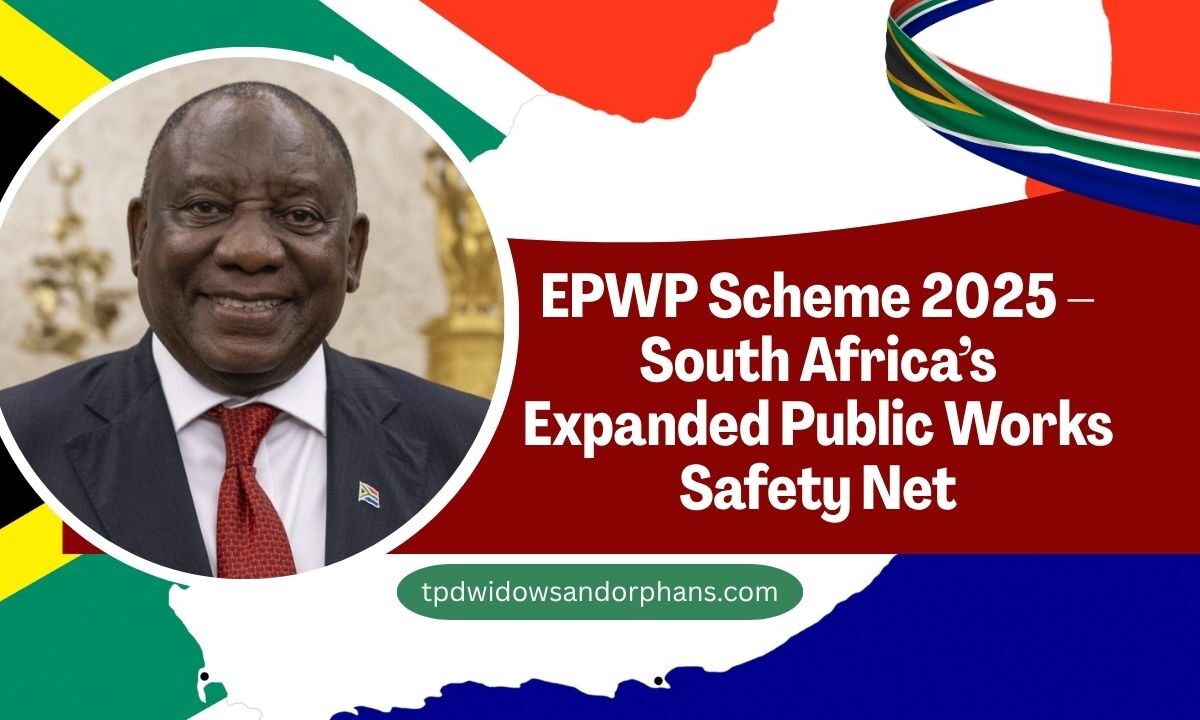The Expanded Public Works Programme (EPWP) 2025 is a cornerstone of South Africa’s social safety net, offering temporary, paid work opportunities to unemployed citizens—especially youth, women, and people with disabilities.
Administered across national, provincial, and municipal levels, EPWP builds public infrastructure, delivers social services, and promotes sustainable livelihoods.
Scheme Objectives & Strategic Focus
- Deliver poverty and income relief through structured public works engagements.
- Generate public assets like roads, parks, sanitation, and early childhood development centres.
- Offer skills training and certification, boosting participants’ employability or entrepreneurial prospects.
Phase V (2025–2029) targets 5 million new EPWP work opportunities, building on the ≈14 million opportunities delivered during Phase IV by early 2024.
Read More- Anti-Hunger & Poverty Scheme 2025: South Africa’s Social Safety Net Plan
Who Qualifies for EPWP in 2025?
Eligibility criteria are inclusive and locally administered:
- South African citizens aged 18–65 who are unemployed and actively seeking work
- Priority for women, youth, people with disabilities, and residents of high‑unemployment communities
- No formal income means test; selection is based on local recruitment via municipal offices or Community Development Workers (CDWs)
EPWP Sectors & Work Types
EPWP is divided into four key sectors offering a variety of roles:
| Sector | Examples of Work |
|---|---|
| Infrastructure | Road repair, sanitation, building maintenance |
| Social | Community health outreach, ECD support, food security |
| Environmental & Culture | Alien vegetation removal, tourism support, conservation |
| Non‑State Sector | NGO‑run development projects, CWP community connectors |
Participants receive a monthly stipend, basic training, and a certificate of service on completion.
Read More- September 2025 SASSA Grant Dates Announced – Full Payment Schedule
Training, Pay & Benefits in 2025
- Participants earn a stipend for completed work—typically paid monthly through approved municipal mechanisms.
- Work assignments are short-term (often 100 days or less) and task-rated with guaranteed rest breaks, sick leave, and safety protections.
- Training includes workplace safety, basic technical skills, and sometimes modules in digital literacy or caregiving.
How to Apply for EPWP (Public Process Guide)
1. Identify Opportunities in Your Area
Check with your local municipality, EPWP provincial office, or job/mobility centres. Community notices and CDWs often circulate application forms.
2. Prepare Required Documents
- Certified copy of RSA ID
- Proof of residence (municipal bill or affidavit)
- Resume or contact details
- Formal Z83 application form for positions in government/NGO admin roles※
A Z83 form and CV are required for EPWP Project Support roles (e.g. data capturer, monitoring). These are usually published with reference numbers in government circulars.
3. Submit Your Application
- Projects typically require hand‑delivered submissions—no email.
- Some circulars specify a closing date and reference numbers; follow details meticulously.
4. Induction & Orientation
Once selected, you’ll attend an induction session, receive your EPWP booklet, and undergo brief training before undertaking work duties on-site.
EPWP in Numbers (2025 Overview)
| Metric | 2025 Status or Target |
|---|---|
| Target job opportunities | ~5 million new roles (Phase V goal) |
| Income relief delivered (to date) | ~R41 billion by end of Phase IV |
| Participant demographics | ~66% women, ~46% youth, ~1% disabled |
| Training & internships | 23,000 trained; 3,000 built-environment internships |
Challenges & 2025 Reforms
Challenges
- Delay in stipend payments, especially in provinces like KZN and Northern Cape, impacts retention.
- Administrative gatekeeping and inconsistent recruitment processes reported in audits.
- Only about 70% transition into formal jobs or self-employment, indicating the need for better exit pathways.
Reforms & Enhancements
- Strengthening partnerships with the Harambee Youth Employment Accelerator to build digital CVs and connect graduates to opportunities.
- Standardizing provider networks and improving stipend payment systems to reduce delays and bureaucracy.
The EPWP Scheme 2025 plays a crucial role in South Africa’s poverty relief efforts—creating temporary paid work, upskilling citizens, and delivering public services at community level.
While the scheme reaches millions, impacts hinge on fixing payment delays, improving job transitions, and scaling training.
Interested candidates should register with municipal EPWP offices or CDWs and follow public notices to secure roles. Start your application today to support your family and community.
Frequently Asked Questions (FAQs)
1. What documents are needed to apply for EPWP?
Typically you need a certified copy of your ID, proof of residence, and optionally a resume or contact details. For certain program support roles, a completed Z83 form and CV are required.
2. How long is an EPWP contract?
Most contracts are short-term, typically around 100 days, with pay based on tasks completed and paid at month-end.
3. Does EPWP include skill training or certification?
Yes. Participants receive basic training in workplace safety, technical skills, and may receive a certificate of service upon completion—useful for future job applications.
